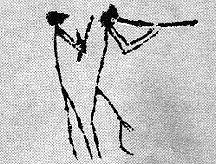[Wesleyan Home Page]
[Wesmaps Home Page]
[Availability Statistics Search]
[Course Description Search]
[Dept. Search]
MUSC522
Seminar in Comparative Music Theory
MUSC522 FA
 Photo Caption and Credits
Photo Caption and Credits
Fall 96 Availability (Last Updated on Sat Mar 8 05:00:40 EST 1997
)
Section Limit Enrollment Available
01 15 11 4
Many concepts and models in music theory previously thought
to be general are now known to be valid for one or only a
few traditions. Experimental music, drawing upon a range of
cultural/musical experience, while at the same time
connecting musical experience with physical and biological
phenomena, has revealed much conventional theory (but not
necessarily ancient theory) to be of limited application.
This seminar examines responses to these challenges.
Examples from different musics will be analyzed; traditional
theories will be examined, and the matter of universals will
be knocked about.
MAJOR READINGS
To be determined as the seminar develops.
EXAMINATIONS AND ASSIGNMENTS
Each student will conduct an
independent research project and compose a substantial
research paper.
ADDITIONAL REQUIREMENTS and/or COMMENTS
Attendance
required. The seminar is designed specifically for Ph.D.
candidates in Ethnomusicology. MA and BA candidates will
be accepted by way of exception.
Unless preregistered students attend the first class meeting
or communicate with the instructor prior to the first class
they will be dropped from the class list. NOTE: Students
must still submit a completed Drop/Add form to the
Registrar's Office.
COURSE FORMAT: Discussion Seminar
REGISTRATION INFORMATION
Level: GR Credit: 1.00
Prerequisites:
None
- Section 01
- Hoyt, P
- Times: ...T... 1:10PM;
- Grading Mode: A/F
- Registration Preference (1 high to 6 low, 0=Excluded) Sr: 2, Jr: 0, So: 0, Fr: 0
- Major Preference Given
Last Updated on MAR-10-1997
About the Photo:
Reference:
Diagram Group. MUSICAL INSTRUMENTS OF THE
WORLD. New York: Facts on File, Inc., 1976
Contact wesmaps@wesleyan.edu to
submit comments or suggestions.
Copyright Wesleyan University, Middletown, Connecticut, 06459
 Photo Caption and Credits
Photo Caption and Credits